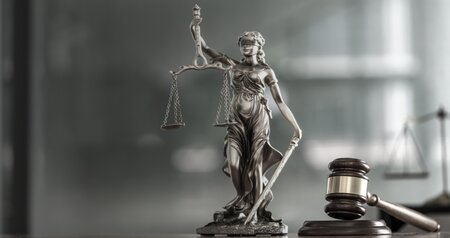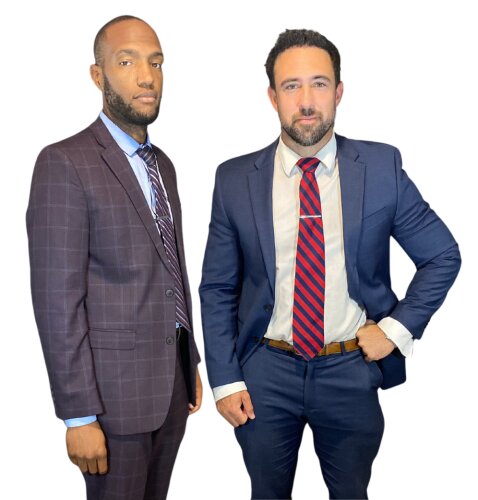Best Criminal Defense Lawyers in Florida
Share your needs with us, get contacted by law firms.
Free. Takes 2 min.
Or refine your search by selecting a city:
List of the best lawyers in Florida, United States
United States Criminal Defense Legal Questions answered by Lawyers
Browse our 1 legal question about Criminal Defense in United States and read the lawyer answers, or ask your own questions for free.
- Do you prosecute local Philippina for violating ESTAFA laws
- I was scammed by a lady presenting herself as my girlfriend.
-
Lawyer answer by mohammad mehdi ghanbari
HelloBased on the laws of the Philippines, you can file a criminal complaint against the person who scammed you for violating the laws on Estafa (swindling). Estafa is a criminal offense that involves defrauding another person of money or property...
Read full answer
United States Criminal Defense Legal Articles
Browse our 3 legal articles about Criminal Defense in United States written by expert lawyers.
- Clearing Your Record in Texas: 2026 Expunction Rules for US
- Criminal defense in the United States protects your rights from the moment of investigation through trial, sentencing, and appeals, and the stakes can include jail, fines, immigration consequences, and your future job prospects. You always have key constitutional rights: to remain silent, to have a lawyer, to be free from... Read more →
- Texas DWI Laws 2026 First Offense Penalties
- If you are arrested in the United States, you have the right to remain silent, the right to a lawyer, and the right to a fair trial - use those rights from the start. Criminal cases move quickly at the beginning: after arrest come booking, bail, your first court appearance,... Read more →
- Texas Bail Reform 2026: Why Bonds Are Harder to Secure in US
- If your loved one has just been arrested, move fast: confirm the exact charges, find out the bond amount, and contact a criminal defense lawyer immediately. In the United States, you have core rights at every stage - to remain silent, to an attorney, to reasonable bail (subject to exceptions),... Read more →
About Criminal Defense Law in Florida, United States
Criminal defense law in Florida involves representing individuals or entities that have been accused of committing a crime under state or federal law. The criminal justice process in Florida begins when a person is arrested and charged with a crime, and it continues through potential pretrial motions, negotiations, trial, sentencing, and appeals. Criminal offenses in Florida can range from minor misdemeanors, such as petty theft or disorderly conduct, to serious felonies like drug trafficking, assault, or homicide. The primary goal of criminal defense is to protect the rights of the accused, ensure a fair trial, and strive for the best possible outcome, whether that is dismissal, acquittal, or reduced penalties.
Why You May Need a Lawyer
Facing criminal charges can be overwhelming and has serious consequences, including jail or prison time, fines, loss of rights, and a permanent criminal record. You may need a criminal defense lawyer if:
- You have been arrested or believe you are under investigation for a crime.
- You were asked to talk to the police or provide a statement.
- You received a summons for court or a notice to appear.
- You are facing charges such as DUI, drug offenses, theft, assault, domestic violence, or white-collar crimes.
- You want to negotiate a plea deal or explore alternatives to jail or prison.
- There are questions about the evidence, legality of a search, or possible violations of your rights.
- You are concerned about the impact of a criminal record on your employment, immigration status, or civil rights.
A skilled criminal defense attorney can help protect your rights, explain your legal options, and provide guidance through every stage of your case.
Local Laws Overview
Florida criminal law is primarily governed by the Florida Statutes, particularly Chapters 775 through 921, which define crimes and penalties. Key aspects include:
- Classification of Offenses: Crimes are categorized as misdemeanors (less serious, punishable by up to one year in county jail) and felonies (more serious, punishable by more than one year in state prison).
- Mandatory Minimum Sentences: Certain offenses, especially drug crimes and firearm offenses, carry mandatory minimum sentences.
- Discovery and Evidence: Florida’s rules of criminal procedure allow for discovery and pretrial motions, where defense attorneys can challenge evidence or seek to dismiss charges.
- DUI Laws: Florida has strict DUI enforcement, with penalties that include fines, license suspension, ignition interlock devices, and possible jail time.
- Stand Your Ground: Florida law includes a “Stand Your Ground” statute, which allows individuals to use force in self-defense under certain circumstances without the duty to retreat.
- Expungement and Sealing: Some criminal records may be eligible for expungement or sealing, which can limit access to your criminal history.
- Juvenile Justice: Juvenile crimes are handled differently, with a focus on rehabilitation, but serious offenses can result in juveniles being tried as adults.
Florida’s legal system is complex, and local courts may have unique rules and procedures that affect how criminal cases are handled.
Frequently Asked Questions
What should I do if I am arrested in Florida?
Remain calm, do not resist the police, and clearly ask for an attorney. Do not answer questions or make statements until you have legal representation.
What are my rights after being arrested?
You have the right to remain silent, the right to an attorney, and the right to a fair trial. Anything you say to law enforcement can be used against you in court.
What is the difference between a misdemeanor and a felony in Florida?
A misdemeanor is a less serious offense, punishable by up to one year in county jail. A felony is more serious and can result in over one year of imprisonment in state prison, along with more severe long-term consequences.
Can I represent myself in a criminal case?
You have the right to represent yourself, but it is generally not recommended. Criminal law is complex, and a mistake could have serious consequences for your future.
What does “plea bargain” mean?
A plea bargain is an agreement between you and the prosecutor to resolve the case without a trial, often in exchange for pleading guilty to a lesser charge or receiving a reduced sentence.
Can a criminal record be cleared in Florida?
Some criminal records can be sealed or expunged in Florida, provided certain eligibility requirements are met. This process limits public access to your record but does not destroy it entirely.
How does bail work in Florida?
Bail is a set amount of money paid to secure your release from jail while awaiting trial. The amount depends on the charges and your criminal history. A judge may also deny bail in serious cases.
What happens if I violate probation?
Violating probation can lead to a warrant for your arrest, additional penalties, or a requirement to serve the original jail or prison sentence. Always consult your attorney if you face a probation violation.
Can police search my car or home without a warrant?
In most cases, police need a warrant or your consent. However, there are exceptions, such as probable cause or urgent situations. If you believe your rights were violated, inform your lawyer immediately.
Do I need a lawyer for a first offense?
Even if it is your first offense or a misdemeanor, having a lawyer is crucial. The consequences can still be serious, and a lawyer can help minimize penalties or even get charges dismissed in some cases.
Additional Resources
For those seeking information or assistance with criminal defense in Florida, consider contacting:
- Florida Bar Association - Offers a lawyer referral service and resources on criminal law.
- Florida Public Defender’s Office - Provides legal representation for those who cannot afford a private attorney.
- Florida Department of Law Enforcement (FDLE) - Offers information on criminal records, expungement, and state laws.
- Florida Courts - The official portal for court information and forms.
- Local Legal Aid Societies - These organizations may provide low-cost or free legal representation in certain cases.
Next Steps
If you are facing criminal charges or believe you may be under investigation in Florida:
- Do not discuss your case with anyone except your attorney.
- Contact a qualified criminal defense lawyer as soon as possible to review your case and advise you of your rights and options.
- Gather all paperwork, police records, and relevant information about your case.
- Attend all scheduled court hearings and follow your attorney’s advice.
- Ask questions and stay informed throughout the legal process.
Finding the right legal help early on is key to protecting your rights and achieving the best possible outcome in your criminal defense case.
Lawzana helps you find the best lawyers and law firms in Florida through a curated and pre-screened list of qualified legal professionals. Our platform offers rankings and detailed profiles of attorneys and law firms, allowing you to compare based on practice areas, including Criminal Defense, experience, and client feedback.
Each profile includes a description of the firm's areas of practice, client reviews, team members and partners, year of establishment, spoken languages, office locations, contact information, social media presence, and any published articles or resources. Most firms on our platform speak English and are experienced in both local and international legal matters.
Get a quote from top-rated law firms in Florida, United States — quickly, securely, and without unnecessary hassle.
Disclaimer:
The information provided on this page is for general informational purposes only and does not constitute legal advice. While we strive to ensure the accuracy and relevance of the content, legal information may change over time, and interpretations of the law can vary. You should always consult with a qualified legal professional for advice specific to your situation.
We disclaim all liability for actions taken or not taken based on the content of this page. If you believe any information is incorrect or outdated, please contact us, and we will review and update it where appropriate.
Browse criminal defense law firms by service in Florida, United States
Florida, United States Attorneys in related practice areas.
Browse criminal defense law firms by city in Florida
Refine your search by selecting a city.















